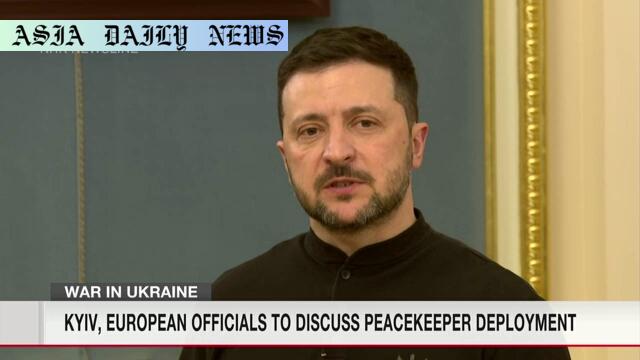Troop Deployments: Zelenskyy plans discussions with European officials on the potential deployment of troops to Ukraine.

Introduction: Zelenskyy’s Vision for Ukraine’s Security
Ukrainian President Volodymyr Zelenskyy is set to engage in a groundbreaking discussion this Friday with delegates from France, Britain, and other European allies. These talks aim to finalize strategies for the prospective deployment of foreign troops into Ukraine. This development comes as a pivotal move amidst ongoing tensions with Russia, signaling a united European front for Ukrainian security. Zelenskyy, addressing a press conference in Kyiv, emphasized the importance of the meeting, highlighting its potential to reshape the region’s geopolitical dynamics.
The Meeting’s Context and Strategic Importance
This conference marks a first-of-its-kind initiative for Ukraine. Slated to occur amidst fragile conditions, the meeting will largely focus on proposals carefully constructed by Ukrainian officials concerning troop numbers and deployment sites. France and Britain have taken proactive steps, confirming their participation and sending high-ranking military representatives to Kyiv. Zelenskyy stressed that the conference is not merely symbolic; instead, it is hoped to result in concrete plans that ensure Ukraine’s security while adhering to any potential ceasefire agreements brokered with Russia.
Security Guarantees and Ceasefire Developments
One primary goal for Zelenskyy and his administration is to secure assurances from European nations and potentially the United States. A ceasefire agreement with Russia stands as the precondition for deploying foreign forces into Ukrainian territory. In the backdrop, the US government under President Joe Biden has been negotiating with key stakeholders on both sides, aiming to create an environment conducive to peace. Zelenskyy has repeatedly argued for robust security guarantees, expressing concerns over the possibility of Russia resuming an invasion, which would make the deployment of foreign troops even more critical.
Implications for Europe and International Relations
The possible deployment of foreign troops to Ukraine is poised to have significant implications for European and international relations. For European countries, including France and Britain, the act of mobilizing troops represents a commitment to peace, stability, and solidarity in Eastern Europe. It also serves as a direct response to growing dependency on NATO to address security challenges in the region. Additionally, the move reflects the collective resolve against any form of aggression or violations of sovereignty.
Future Prospects Beyond Deployment
Beyond the immediate discussions about military assistance, this meeting brings broader questions into focus. For instance, how sustainable can European troop deployment be in the long term? What mechanisms might be put in place to ensure that Russia honors any ceasefire agreement? Furthermore, will Ukraine receive continued support to rebuild its economy and infrastructure affected by years of conflict? These are matters that will undoubtedly play a crucial role in Friday’s discussions and beyond.
Conclusion: The Path Ahead for Ukraine
Zelenskyy’s forthcoming meeting with European nations is an essential step toward safeguarding Ukraine’s sovereignty. It also stands as a testament to international unity in the face of adversity. While the deployment of foreign troops currently hinges on the successful negotiation of a ceasefire agreement with Russia, the intent behind this initiative underscores a broader commitment to reinforcing peace and stability in the region. Ukraine’s leadership, backed by allies, is resolute in fostering a future of resilience, security, and enhanced global legitimacy.
Commentary
Potential of a United Front for Global Security
The proposed meeting between President Zelenskyy and European military representatives marks a crucial moment not only for Ukraine but for the stability of Europe as a whole. It is inspiring to see nations taking proactive steps, indicating their readiness to defend sovereignty and international order. France and Britain, as pivotal players, are demonstrating that collaborative diplomacy can serve as a cornerstone for peace initiatives. This commitment to collective security sets an example for global efforts in conflict resolution.
The Role of Ceasefire in Long-Term Peace
Achieving and maintaining a ceasefire between Russia and Ukraine is of paramount importance in paving the way for lasting peace. While troop deployments are undoubtedly a strong signal of international support for Ukraine, they must be predicated on a responsible and sustainable approach. A ceasefire agreement would serve as a foundational step, albeit not the ultimate solution. It is essential that both sides operate in good faith, with international mediators like the United States ensuring accountability in adherence to the agreement.
Challenges Ahead for Ukraine and Allies
Despite the optimism surrounding the meeting, challenges remain. How will European nations balance their commitments to Ukraine with domestic priorities? Additionally, the logistical and political difficulties of coordinating troop deployments across national borders cannot be understated. For Ukraine, the need to rebuild and fortify its institutions will require not just military support but sustained economic and diplomatic backing as well.
Final Thought: A Step Toward Stability
This meeting is more than a military strategy session; it is a declaration of international solidarity with a nation enduring hardship. By convening these talks, Zelenskyy and his European allies are taking a brave step toward ensuring territorial integrity while sending a clear message to aggressors: the world will not stand silent in the face of injustice. The outcomes of this important conference will likely resonate far beyond the borders of Ukraine, shaping global diplomacy in the years to come.


